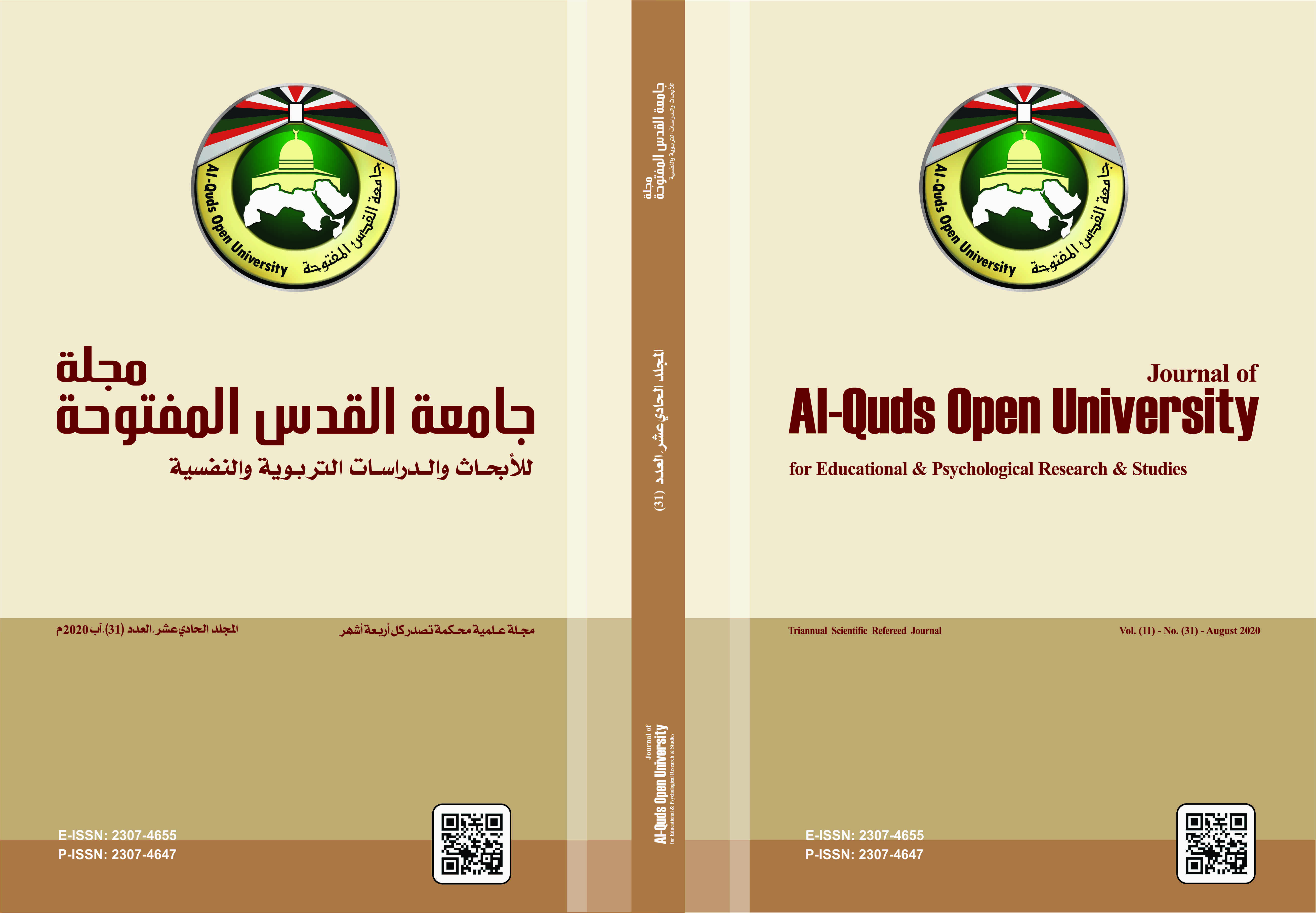The Level of Self - Compassion and Its Relationship with Happiness Among Secondary Stage Students in Irbid Governorate from Their Viewpoint
DOI:
https://doi.org/10.33977/1182-011-031-005Keywords:
Self - Compassion, Happiness.Abstract
This study aimed to reveal the self - compassion and its relationship with happiness among secondary stage students in Irbid Governorate from their viewpoint. To achieve the objectives of the study, the researcher used the self - compassion scale, prepared by Neff (2003) , and translated by the researcher, and the happiness scale, prepared by Hills & Argyle (2002) , and translated to Arabic by Abu Dweib (2010) . The sample of the study consisted of 143 male and female students. The results of the study showed that the level of self - compassion and level of happiness were moderate degrees, and there were differences in the self - compassion depending on the gender variable, in favor of females. There were no differences in the level of happiness, depending on the gender variable. There were differences in the self - compassion and happiness depending on the academic achievement variable among those with high academic achievement on the one hand, and those with low and intermediate educational achievement in favor of those with high educational achievement. The results showed that there was correlative relationship between self - compassion and happiness among secondary school students.
References
قائمة المراجع
أولاً: المراجع العربية
أبو ذويب، أحمد. (2010). السعادة وعلاقتها بالذكاء المعرفي والانفعالي لدى طلبة جامعة اليرموك. أطروحة دكتوراه غير منشورة، جامعة اليرموك، إربد، الأردن.
آدم، بسماء والشيخ، كنان. (2018). الشفقة بالذات وعلاقتها بالسعادة النفسية دراسة ميدانية على عينة من طلبة جامعة دمشق. مجلة جامعة طرطوس للبحوث والدراسات العلمية – سلسلة الآداب والعلوم الإنسانية، 2(1)، 45- 72.
الجمال، سمية. (2011). السعادة النفسية وعلاقتها بالتحصيل الدراسي والاتجاه نحو الدراسة الجامعية لدى طلاب جامعة تبوك. رسالة ماجستير غير منشورة، جامعة تبوك، السعودية.
الزعبي، أحمد والعاسمي، رياض. (2015). الشفقة بالذات وعلاقته بكل من الأمل الأكاديمي والاكتئاب لدى عينة من الطلبة مرتفعي ومنخفضي التحصيل الدراسي في المدارس الثانوية بمحافظة دمشق. مجلة جامعة دمشق للعلوم التربوية والنفسية، 31(1)، 55-90.
العبيدي، عفراء. (2015). الحكمة وعلاقتها بالسعادة النفسية لدى عينة من طلبة جامعة بغداد. المجلة العربية لتطوير التفوق، بغداد، 6(10)، 181-201.
العبيدي، عفراء.(2017). الشفقة بالذات لدى طلبة الجامعة في ضوء بعض المتغيرات. مجلة العلوم الاجتماعية، 26، 14-55.
علوان، عماد. (2016). الشفقة بالذات والشعور بالذنب لدى الأحداث الجانحين المودعين بدار الملاحظة الاجتماعية بمدينة أبها. المجلة الدولية التربوية المتخصصة، 5(9)، 1-22.
ثانياً: المراجع الأجنبية
Arimitsu, K. & Hofmann, S. (2015): Cognition as mediators in the relationship between self-compassion and affect. Personality and Individual Differences, 74, 41-48.
Brach, T. (2003). Radical acceptance: embracing your life with the heart of a Buddha. New York: Bantam.
Diener, E. & Suho, E. (2000). Culture and Subjective well- being. Massachusetts: MIT Press.
Flowers, J. & Christakis, L. (2009). Dynamic Spread of Happiness in a large Network. Finest Journal, 1(1): 2-14.
Hills, P. & Argyle, M. (2002). The Oxford Happiness Questionnaire: A compact scale for the measurement of psychological well-being. Personality and Individual Differences. 33, 1071-1082.
Kifper, S. (2006). The Theology of Happiness. NJ: The free press.
Lykken, D. & Gsikszentmihalyi, M. (2001). Happiness stuck with what yuo've got? Social Psyclology, 19 (4), 470-471.
Morris, D. (2004). The Nature of Happiness. London: Little Books Press.
Neff, K & Pittman, M. (2010). Self-compassion and Psychological Resilience Among Adolescents and Young Adults. Self and Identity, (9), 225–240.
Neff, K. & Tirch, D. (2013). Self Compassion and ACT. In T.B. Kashdan, J. Ciarrochi (Eds), Mindfulness. Acceptance, and Positive Psychology: The Seven Foundations of Well-being. OaKland, CA Us: Context Press, New Harbinger Publications, 78-106.
Neff, K. & Vonk, R. (2009). Self-Compassion Versus Global Self-Esteem: Two Different Ways of Relating to Oneself. Journal of Personality, 77(1), 23-50.
Neff, K. (2003). Self Compassion: An Alternative Conceptualization of A .Healthy Attitude Toward One Self . Self and Identity. (2), 85-120.
Neff, K., Kirkpatrick, L., Stephanie, B. & Rude, S. (2007). Self compassion and adaptive psychological functioning. Journal of Research in Personality, 41, 139–154.
Richard, L. (2005). Happiness; Lessons From A new Science. Penguin press, New York.
Scott, C., Carol, R., Diane, B. & Kevin, C. (2013). Comparing Self-Compassion, Mindfulness, and Psychological flexibility as Predictors of Psychological Health. Mindfulness. DOI 10.1007/s12671-013-0195-9.
Seligman, M. (2002). Authentic Happiness: Using the new Positive Psychology to Realize Your Potential for Lasting Fulfillment. New York: Free Press.
Seligman, P. (2004). Can Happiness be Taught. Daedalus Journal, 3 (2), 1- 59.
Skoda, A, (2011). Self-compassion, Depression and Forgiveness of others. University of Dayton .Ohio.
Veenhoven, R. (2005). World Database of Happiness. Social Psychology, 4 (1), 348- 365.
Walker, L. & Colosimob, K. (2010). Mindfulness, self compassion, and happiness in non-meditators: A theoretical and empirical examination. Personality and Individual Differences, 50 (2), 222-227.
Yu-Wen, A. & Ying, T. (2009). Self-Compassion to Competence and mental health social Work and Student. Journal of Social Work Education, 45(2), 309-325.
Downloads
Published
How to Cite
Issue
Section
License
- The editorial board confirms its commitment to the intellectual property rights
- Researchers also have to commit to the intellectual property rights.
- The research copyrights and publication are owned by the Journal once the researcher is notified about the approval of the paper. The scientific materials published or approved for publishing in the Journal should not be republished unless a written acknowledgment is obtained by the Deanship of Scientific Research.
- Research papers should not be published or republished unless a written acknowledgement is obtained from the Deanship of Scientific Research.
- The researcher has the right to accredit the research to himself, and to place his name on all the copies, editions and volumes published.
- The author has the right to request the accreditation of the published papers to himself.







2.png)






_2.png)

